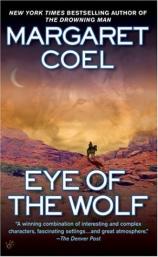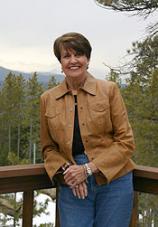Interview: September 9, 2005
September 9, 2005
Bookreporter.com's Carol Fitzgerald, Joe Hartlaub and Wiley Saichek interviewed Margaret Coel, the New York Times bestselling author of the critically acclaimed Wind River Reservation mysteries. Coel talks about the research that was necessary for EYE OF THE WOLF --- the eleventh book in this series --- and the themes that have been carried over from the previous ten volumes. She also discusses the complexities of her characters, her passion for American Western history, and her methods for planning future novels.
Bookreporter.com: Could you share some background on Father O'Malley and Vicky Holden for readers who may be reading the Wind River Reservation series for the first time with EYE OF THE WOLF?
Margaret Coel: To begin with, they are both what the Arapahos call "edge people," because they live at the edge of the Arapaho culture and the outside culture. They understand both, and move easily from one to the other.
In Vicky's case, she was born on the Wind River Reservation. After her marriage to the drunken and abusive Ben Holden ended, Vicky moved to Denver, graduated from law school, and worked in a big downtown law firm. Ten years later she returned to the reservation, no longer the traditional Arapaho woman she had once been, but modern and educated and intent upon using the white man's laws to help her people. This presents some conflict for her --- the fact that she is not traditional, but has stepped out ahead of the men and "made herself a chief," as the grandmothers say. The grandmothers call her Hi sei ci nihi, Woman Alone.
Father John comes from the opposite direction. He's a redheaded Irishman from Boston who had been on an academic career path when he was surprised by a calling to be a priest, a Jesuit, which was not at all in his plans. Nor had he planned to work at an obscure Indian mission in the middle of Wyoming, which is where he was sent after a year in alcoholic rehab. As he says in EYE OF THE WOLF, he arrived at St. Francis Mission still wobbly with his newfound sobriety. That was nine years ago, and in that time he has come to love the Arapaho people and their culture and, of course, he and Vicky have solved a lot of mysteries. There's a definite attraction between this fallen priest and the beautiful Arapaho lawyer, but Father John is trying to live by his vows and be the priest he was called to be.
BRC: EYE OF THE WOLF immediately grabs a reader's attention from the first two pages, as the reader and Father John both want to find out about the phone call. Is writing opening chapters that jump-start the story something that comes easily for you, or is it challenging to get it "just right?"
MC: It's both easy and challenging. Let me explain. The first draft is challenging, in that I'm sort of feeling my way forward, not knowing for sure what I want to do. But I've learned to leave that draft alone and plunge on through the novel. When I reach the end, I know exactly how the story has to start, so I go back and rewrite the opening, and then it's easy.
BRC: In EYE OF THE WOLF you did a remarkable job creating the tense atmosphere between the Arapahos and the Shoshones. Was the research for this particular novel more difficult due to the sensitive nature of the Bate's Battle? What sparked your decision to focus on this particular battle for EYE OF THE WOLF?
MC: A few years ago, an Arapaho friend told me about how you can still hear the cries of the people and the howling of the wolves when you visit the battlefield. I thought, Now that's something! It really sparked my interest. Research meant reading through historical accounts of the battle, so that was not difficult. What was difficult was locating the actual battlefield, which is in the Wyoming badlands, a truly desolate area of bluffs and precipitous canyons, wagon roads and sagebrush. The writing was also difficult because the battle is still a sensitive issue between Shoshones and Arapahos, who have to live together on the reservation. I had to keep telling myself, "You're writing fiction here. What happens in the plot is just a story." In fact, the two tribes get along remarkably well.
BRC: One of the ongoing themes of your novels --- and a particularly strong one in EYE OF THE WOLF --- is the many ways in which the actions of the past, even the distant past, overshadow the present and future. Did you set out to write this theme from the start, or did it evolve as you wrote?
MC: I didn't really set out to follow the history theme. It just comes naturally. I believe it's my former career as a writer of history books that keeps inserting itself. The plot for my first novel, THE EAGLE CATCHER, came from the research I had done for CHIEF LEFT HAND, the biography and history that I had written about the Arapahos. Ever since, a bit of the past has continued to show up in my stories. The fact is, I love history, and I'm always aware of the way in which the past is still hanging around the present and sometimes still causing trouble. This is especially true in Indian country.
BRC: The recent scandal involving the priesthood has eclipsed two other problems that have concerned the clergy, which you dealt with in your earlier novels and more fully explore in EYE OF THE WOLF --- those of alcohol abuse and clerical celibacy. The problems that Father O'Malley experiences are very real-world ones, particularly with his attraction to Vicky Holden, are very true to life. Have you based O'Malley's experiences on secondhand accounts you encountered in the course of your research, or through first person interviews?
MC: Not really, although I suppose everything I've read and heard about the problems that priests face have influenced my interpretation of Father John's character. But the bottom line is, I see him as a human being with various strengths and flaws, like the rest of us. It seems to me that any red-blooded male is going to feel an attraction to a beautiful woman, and if that male happens to have taken a vow of celibacy, well, he's going to have to make some choices. What interests me is the choices that Father John makes, how he makes them, and the temptations and difficulties that he faces. He is only a man, after all, and one who has earlier given into the temptation of alcohol. I like him precisely because he has to struggle.
BRC: On a related note, Father Ian McCauley, O'Malley's assistant, is an extremely interesting character. Will we be seeing more of McCauley in future River Reservation novels? And if so, do you plan to give him a more prominent role at some point?
MC: Father McCauley is in the next novel, THE DROWNING MAN. The guy interests me because he's a contender for Father John's job. He's first in a long line of assistant priests that Father John has had to put up with who actually wants to be at the mission. He's also very competent, so in fact St. Francis Mission would be in good hands with him. But this presents a problem for Father John because his one hope of staying at St. Francis has been the fact that no one else wanted the job. And of course Father John does not want to leave.
BRC: When you were in school, did you enjoy studying history?
MC: I've always loved history. Always. I studied as much of it as I could. All kinds of history, but my first love has always been the history of the American West. I wrote four nonfiction history books on the West before I shifted into writing mystery novels. But I brought my love of history with me. \
BRC: What is the part of doing research for your books that you enjoy the most?
MC: Oh, without question, spending time on the Wind River Reservation. I love being with the Arapaho people, going to powwows and other celebrations, and driving the roads and visiting the places that I write about. I always stay at St. Stephen's Mission, the actual mission upon which I base my fictional mission. I love to walk the grounds, go to Mass in the beautiful church, and imagine Father John being there, too.
BRC: EYE OF THE WOLF is your eleventh River Reservation novel. What are the challenges of sustaining such a long running series? What is the most rewarding part of working with recurring characters?
MC: Well, there are a number of challenges, all of which I find interesting. The characters have the same background, so it's quite challenging to present the same basic information in a new and interesting way in each novel. Nobody wants to read the same old thing about how and why Vicky left Ben Holden and went to law school. It's important to understanding her character, but in each novel, I work hard at coming to the information in a different way. The same is true for Father John and the story of how he came to be at St. Francis. Basically, I don't want to bore myself, and I certainly don't want to bore my readers, so I expand on the basic backgrounds and give a slightly different perspective in each novel.
The rewards for recurring characters are great! It's so much fun watching Father John and Vicky change and grow, face tough challenges and come out stronger at the other end. They're like old friends, and I'm always rooting for them.
BRC: Have you written outlines for a number of future books in the series? And do you have any plans to perhaps introduce a new series in the future?
MC: Outlines for future books? Nope. I take it one book at a time. Usually while I'm writing a novel, the plot for the next novel comes to me. Sometimes it comes from a side road that I'm tempted to explore in the current novel. Instead of exploring it then, I make a note to explore it in the next novel. What's interesting, I think, is that I've never been worried about finding the next plot. I trust that the plot will come to me, and it always has.
No plans at the moment for a new series, but you never know. The truth is, I never know what I might write next. It depends upon what pops into my head.
BRC: Are there any authors in particular who you feel have influenced your work?
MC: I don't know if "influenced" is the right word, because it infers that my work might in some way be like the work of some authors that I greatly admire. I read authors like John le Carre, Robert Harris, Peter Robinson, Deborah Crombie, Sharyn McCrumb, and I think, Wow! I would love to be able to write like that.
BRC: What authors --- of any genre --- do you enjoy reading for pleasure?
MC: All of the above, for starters. I'm a very eclectic reader. I love Henry James, Jane Austen, Edith Wharton, F. Scott Fitzgerald, some books by Larry McMurtry (not all), Ian Frazier, Ann Patchett, Alison Lurie, and a wonderful writer I just discovered: Alice Elliott Dark, and any and all books about Russia.
BRC: What are you working on now, and when can readers expect to see it?
MC: THE DROWNING MAN, number twelve in the Wind River series. I'm just finishing it now, wrestling it into shape. It will be out in the fall of 2006.




